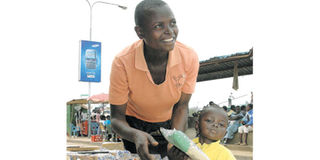Food crisis set to ease, says report

A hawker sells sugar at a Kisumu bus park for Sh220 a kilo. Sugar is cited in the World Bank report as one of the commodities whose price has gone up beyond the reach of many in Kenya. Photo/FILE
Food supply in Kenya is expected to improve slightly, a new World Bank report says.
The bank’s quarterly food price index attributes this to relief work by various organisations as well as an anticipated decline in staple food prices.
It also attributes this to weather forecasts that the region would receive “near normal to above normal” rains between October and December.
The bank has now downgraded Kenya and Ethiopia from “a humanitarian disaster phase” to a “crisis status”.
The report said on Wednesday that food supply in pastoral areas of Kenya and Ethiopia was expected to improve to a crisis status, down from the humanitarian disaster phase.
Prices of basics such as cooking oil, flour and kerosene have skyrocketed, signalling bad times for low-income families that have found it difficult to put a plate of ugali on the table.
Sugar, wheat flour and bread prices are also high.
According to the report, the crisis in the Horn of Africa is not over and touches more than 13.3 million people — an extra million since August.
In Somalia, those suffering are now four million, with at least 750,000 at risk of death due to famine in the next four months.
The report says prices of grains in the region rose 30 per cent between September last year and this year, with maize going up 43 per cent, rice 26 per cent and wheat 16 per cent. Soybean oil went up 26 per cent.
Over the last quarter, however, prices of grains went up by three per cent but the cost of fats and oils went down by three per cent.
Globally, the bank says, food prices have remained “high and volatile”, hitting the poorest countries hardest.
While the bank’s food price index has dropped five per cent from its February 2011 peak and dipped marginally in September by one per cent, it remains 19 per cent above its September 2010 levels.
“The food crisis is far from over,” said World Bank Group president Robert B. Zoellick. “The prices remain volatile and millions are still suffering,” he added.




